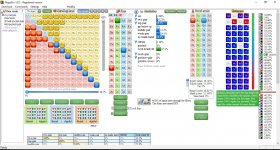There you go:
I'm assigning him a conservative defense range of {99-22, AJs-A2s, AQo-A2o, KQs-K8s, KQo-K9o, QJs-Q9s, QJo-QTo, JTs-J9s, JTo, T9s, T9o, 98s, 98o, 87s, 76s, 65s, 54s}
Against that range, on a {Ac, 9d, 6h}, we have 55% equity.
EVcheck = 0.55*6.5 = +3.575
EVbet = 0.285*6.5+(0.285*14.5)-(0.43*4) = 1.85 + 4.13 - 1.72 = +4.26 (i.e 28.5% missed the flop, so folds. 28.5% has middle pair, weak pair, OESD that won't fold to a c-bet, 43%, the rest, we're beat. And you C-betting 4 bb, assuming the opponent is the kind of player who doesn't fold any pair or draw)
Now lets come to the game plan. If we check the flop, then the opponent has every right to bet the turn with the weak, middle pair hands and should bet hoping that we just missed the flop, why else would we check the board in Position? We're going to get into a lot of trouble with 1/2 pot turn bet (3.6 bb), 1/2 pot river bet (6.8bb); we'll just have to pay it off. Or have we narrowed down his range to A-x, two pair, already? And a lot can change in the turn and the river.
You have some errors in the calculation. We don't have 100% equity when worse hands call, and our equity is (win%*pot - bet). Even if we had 100%, it would be (0.285 * 14.5 - 4) or 0.1325 in your original calculations, but worse in the actual. We also have equity when called by better 43%*(8.69%*14.5 - 4) or -1.18, which is not quite as bad as you gave.
I get 53.19% equity with that range checked down. This is just using Equilab, but that shouldn't be off too much.
If it checks down, we have 3.46xbb average EV.
There are 289 combos in this range.
129 of them are {top pair, two pair, or better}: 8.69%
78 of them are single pairs {middle, second, or worse}: 84.75%
4 of them are open-ended straight draws: 63.91%
78 of them could be considered complete misses and will fold: 100%
129/289 * (8.69% * 14.5 - 4): -1.223
78/289 * (84.75% * 14.5 - 4): +2.237
4/289 * (63.91% * 14.5 - 4): +0.073
78/289 * (100% * 6.5): +1.754
Total combined EV: +2.841
2.841 is worse than 3.46, so betting the flop makes us less money than checking, even in your scenario. A scenario where we get calls from 22, 33, and 65s, all of which have no draw and are horrible pairs. I think that is pretty optimistic on an Ace high flop, OOP, against a pre-flop raiser. I think these assumptions are far too optimistic, but we can go by them.
Checking the flop and calling the turn will have higher or at least equal expectation to betting (as we can assume that hands which won't call on the flop might bet the turn when we show weakness). We are still calling against all the hands which beat us, so our EV will be worse than if it checked down.
Are you really worried about being double-barrel-bluffed on the turn and river OOP on an Ace high flop, just because you checked behind on the flop? If so, the solution is going to be adding more value to your flop checking range. Hands like AQ (and KK ironically enough), where you can check and call turns and some rivers (not with KK but yes with AQ) when an opponent decides to lead. You can also bet AQ on the turn, if your opponent checks again. Heck, I probably check behind AA here, because there's just nothing out there that can call a bet.
It is really suicidal for the OOP player to have a high two barrel frequency on the turn and river here. There are many A-x hands in the Button's raising range which won't always bet this flop, but also aren't folding to two bets. Granted, some of the worst of those hands "should" be folds to two bets, but people don't like to fold Aces, even Ace-X they would never bet themselves.
Why do we check behind in position aside from because we missed and/or are weak? Pot control, encouraging bluffs, deception, etc. Or, like in this spot, because checking the flop and calling a single bet on a later street is higher EV than betting the flop is.











